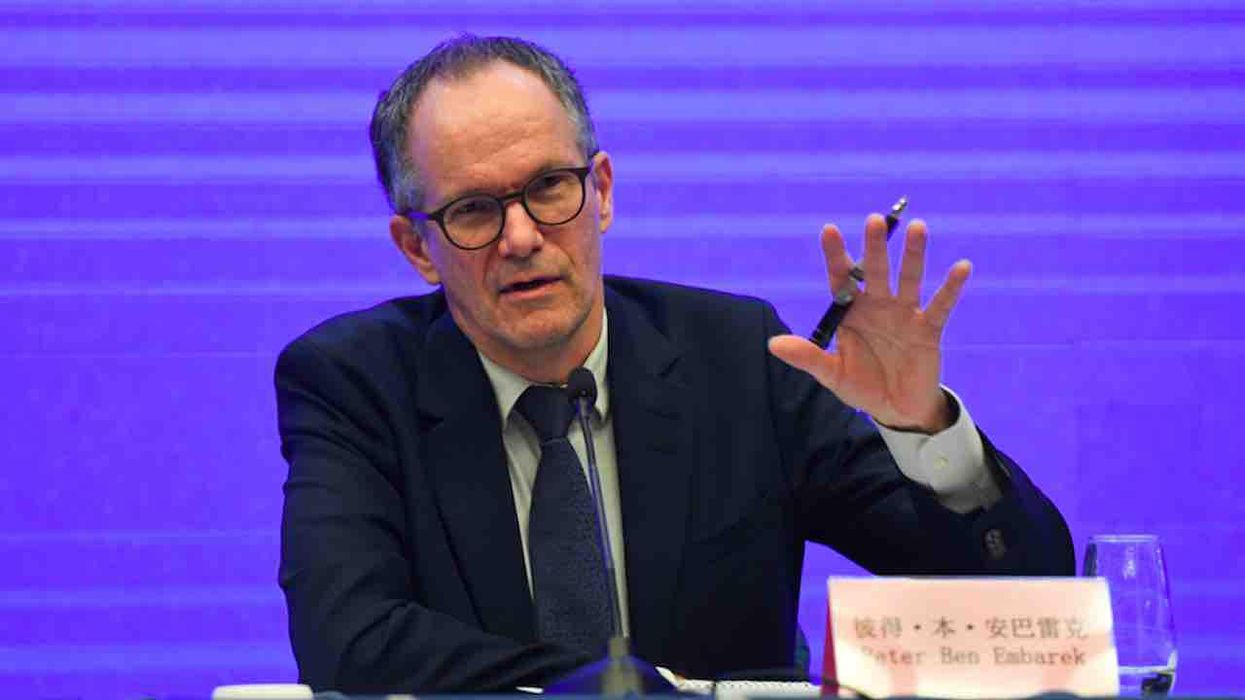
Peter Ben Embarek of the WHO-China joint study team at press conference, Feb. 9, 2021. (Xinhua/Cheng Min via Getty Images)

A World Health Organization researcher said the notion of a Wuhan lab worker getting infected while taking samples in a bat cave and bringing back COVID-19 is a "likely hypothesis" for the origin of the pandemic — and that Chinese researchers tried quashing the lab-leak theory, the Washington Post reported.
Peter Ben Embarek — who led an investigation into the virus' beginnings with Chinese researchers — said in a documentary airing Thursday night on Danish television that his Chinese counterparts continually pushed back against the lab-leak theory, the paper said.
"In the beginning, they didn't want anything about the lab [in the report], because it was impossible, so there was no need to waste time on that," Ben Embarek said during the interview, the Post noted. "We insisted on including it because it was part of the whole issue about where the virus originated."
The WHO sent a 10-member investigative team to Wuhan in mid-January, and nearly a month later the team concluded it is "extremely unlikely" that COVID-19 originated from the Wuhan Institute of Virology or a similar lab.
"The findings suggest that the laboratory incidents hypothesis is extremely unlikely to explain the introduction of the virus to the human population," Ben Embarek, an expert with the WHO food safety and animal diseases division, said at the time, the Associated Press reported.
But the Post said Ben Embarek told Danish reporters that a discussion of whether to include the lab-leak theory at all lasted until 48 hours before the investigation was over — and that finally his Chinese counterpart agreed to discuss the lab-leak theory in the report "on the condition we didn't recommend any specific studies to further that hypothesis."
More from the Post:
Asked in the documentary whether the report's "extremely unlikely" wording about the lab-leak theory was a Chinese requirement, Ben Embarek said "it was the category we chose to put it in at the end, yes." But he added that this meant it was not impossible, just not likely.
Ben Embarek said one similar scenario, in which a lab employee inadvertently could have brought the virus to Wuhan after collecting samples in the field, could be considered both a lab-leak theory and a hypothesis of direct infection from a bat, which was described as "likely" in the report.
"A lab employee infected in the field while collecting samples in a bat cave — such a scenario belongs both as a lab-leak hypothesis and as our first hypothesis of direct infection from bat to human," Ben Embarek said, according to the paper. "We've seen that hypothesis as a likely hypothesis."
More from the Post:
In further comments during the interview that were not included in the documentary but were incorporated in an account by TV2 on its website, Ben Embarek suggested that there could have been "human error" but that the Chinese political system does not allow authorities to admit that.
"It probably means there's a human error behind such an event, and they're not very happy to admit that," Ben Embarek was quoted as saying. "The whole system focuses a lot on being infallible, and everything must be perfect," he added. "Somebody could also wish to hide something. Who knows?"
Asked for comment, Ben Embarek initially said the interview had been mistranslated in English-language media coverage. "It is a wrong translation from a Danish article," he wrote, declining to comment further and referring The Post to the WHO. He did not immediately respond to follow-up questions.
WHO spokesman Tarik Jasarevic also told the paper that the comment was mistranslated and that the interview took place "months ago."
"There are no new elements nor [a] change of the position [that] all hypothesis are on the table and WHO works with member states on the next step," Jasarevic added to the Post in reference to comments by senior WHO officials about the probe.
"The Virus Mystery" documentary is scheduled to air on the Danish channel TV2 Thursday evening, the paper said.
Here's a look at related issues in a video report from late last month:
China says WHO plan to audit labs in Covid origins probe 'arrogant' • FRANCE 24 Englishyoutu.be